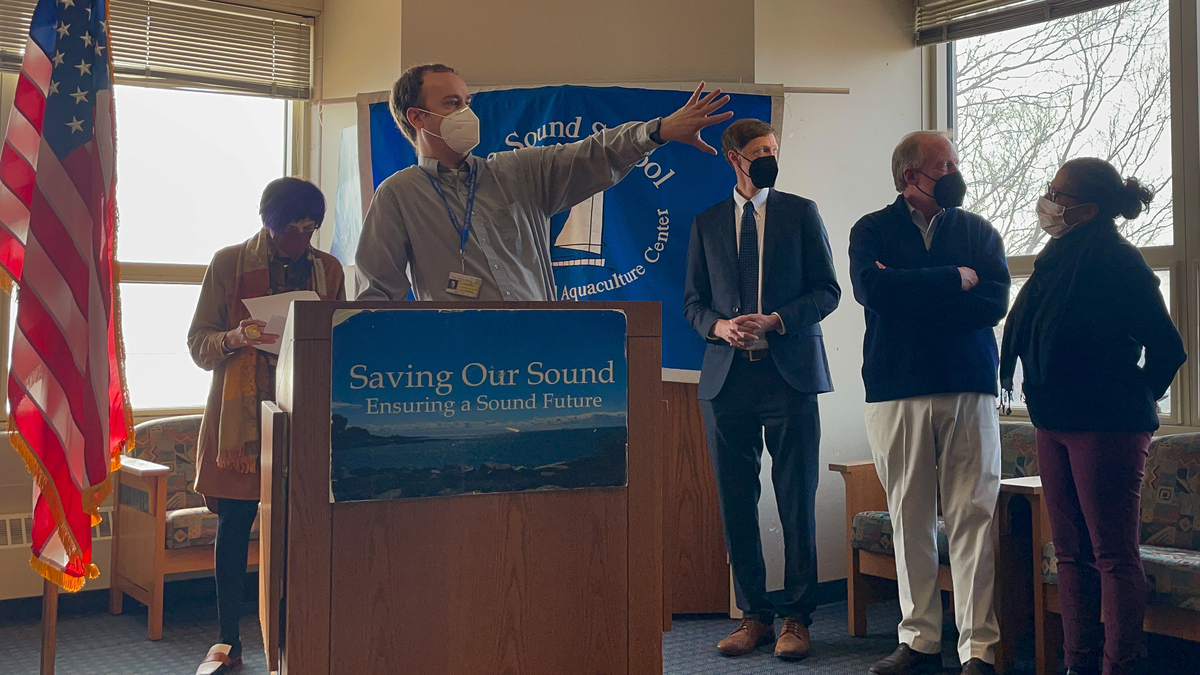Rising tides: feds fund $223 million Long Wharf development
New Haven plans to prevent flooding and expand port access in Long Wharf

Charlotte Hughes, Contributing Photographer
As New Haven develops its coastal Long Wharf district for residential and commercial use, U.S. Representative Rosa DeLauro, D-Conn., has brought home $160 million in funding for a Coastal Storm Risk Management Project. The city will also receive $63 million for a Harbor Navigation Improvement Project.
On the shores of the Long Island Sound, Long Wharf faces storms and floods that climate change has intensified in previous years. The Coastal Storm Risk Management Project hopes to guard against these rising tides by building a flood wall, flood gates and a pump station. The Harbor Navigation Improvement Project will allow larger ships to access the port by deepening the channel bed from 35 to 40 feet. DeLauro hopes that these building projects, funded under U.S. President Joe Biden’s bipartisan infrastructure law, will be “game-changers” to bring economic development to the district. City Engineer Giovanni Zinn expects that the Coastal Storm Risk Management Project will take approximately five years to complete, and that the harbor project will take a “number of years.”
“We need to be proactive about preparing for [natural disasters], minimizing the damage, protecting the areas from the damage,” DeLauro said during a Monday morning press conference. “It’s a new dawn with regard to federal resources really being pumped into states and cities, localities in order to rebuild roads, bridges, ports.”
By 2050, Connecticut’s sea levels will rise by approximately 20 inches, according to Zinn, worsening flooding from storms, like Hurricane Henri in August 2021.
During one of these disasters, Ward 6 Alder Carmen Rodriguez recounted seeing “the water come up and boats by the stop sign.” She said that wants her constituents to have homes to come back to.
Carlos Eyzaguirre, the New Haven deputy economic development administrator, added that the waterfront development would happen in a “thoughtful, intentional” manner. Eyzaguirre said that resiliency projects like the Coastal Storm Risk Management Project will lay the groundwork for the Long Wharf Responsible Growth Plan. Currently, the district boasts businesses such as IKEA and Jordan’s Furniture, along with a host of food trucks. The Responsible Growth Plan aims to turn Long Wharf into a neighborhood with apartments, parks, a food hall and a public market.
But three residents said that the Responsible Growth Plan overlooked the interests of the immigrant workers and owners of the food trucks in favor of red tape — licenses, ordinances and regulations. Before the news of the Coastal Storm Risk Management Project, the Connecticut Department of Energy and Environmental Protection criticized the plan’s potential impacts on public safety with the danger of tides, storm surges and rising sea levels.
Zinn reported that in addition to the flood wall, flood gates and pump station, the city will build a “living shoreline,” a stable shoreline made of natural materials like plants, sand or rock. Long Wharf already has pockets of marshes on its shore, but the living shoreline will help the marshes grow and expand. In turn, the marshes will prevent erosion. Beyond federal funding, the project will receive help from the Connecticut Department of Energy and Environmental Protection.
“It’s a way to create a Long Wharf that is still livable and enjoyed by so many people for those 999 days out of 1000 when we don’t have a hurricane, and then for that one day out of 1000,” Zinn explained.
Zinn added that he expects that the Navigation Improvement Project will make the New Haven port generally more productive and able to import goods such as oil, steel, and concrete, as DeLauro noted.
“We have become a consuming nation rather than a building nation,” DeLauro said. “The emphasis [of these projects] is to get us back to building and what that building means for the economic survival of the country, what it means for manufacturing.”
This “project” will bring additional construction jobs to the Long Wharf district. It is unclear how the construction will impact the Long Wharf marshes and ecosystem, although Mayor Justin Elicker said that the city has a “multi pronged strategy around climate response and resilience.”
However, the focus of Biden’s bipartisan infrastructure law is building. The marshes around Long Wharf will see more, not less, human construction and development.
Long Wharf is home to approximately 5,000 jobs.







